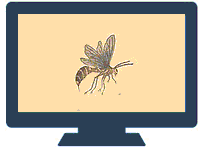Entomology, Department of

Department of Entomology: Distance Master of Science Projects
Date of this Version
3-2015
Document Type
Project
Citation
E. Kniep, 2015. Development of a screening program for identification of the neoplastic pod gene (Np) in Syngenta snap peas. Master's project, University of Nebraska-Lincoln.
Abstract
Project Objective The purpose of this project was to design a method for screening Syngenta snap pea varieties for the neoplastic podded gene (np). Pea varieties will be characterized phenotypically using weevil extracts to produce a neoplasm response of the np gene. Screening for neoplasms will enable the breeding team to understand if the gene is present how it might or might not be affecting pod quality reductions.
Project Outcomes and Significance The most important outcome was discovered during the proof of concept phase of protocol creation when it was established that the np gene is likely not the gene causing pod quality reductions. This is very significant because it eliminates a variable and allows for focus on other potential causes. A second outcome was the fact that weevil extracts were not needed to verify if the np gene was present. Based on the initial work with the check varieties, the low light environment of the greenhouse was a very consistent inducer of the neoplasm response. Both a low light and a weevil extract protocol are included in this project. The weevil protocol is still a valid approach and was the initial direction for the project. The low light protocol is the more practical option for the breeding program and will be what is used this fall to verify that the np gene is in fact not the issue. A third outcome was finding a direction for the next steps in the long term investigation into pod quality. A field in Washington was exposed to severe sand damage that had many of the same characteristics as the damage seen in California. Further testing will be conducted to explore sand damage and its impact on pod quality.


Comments
Master’s Degree Project March 2015